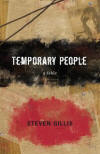Temporary People
Like many readers my age, I grew up reading not literary fiction but the twin pillars of fantasy and science fiction. As an adult, I’ve mostly left those pleasures behind, except for those genre-bending writers in the mainstream literary world, writers like George Saunders, Aimee Bender, Michael Chabon, or Jonathan Lethem. For the most part, I don’t regret the transition in my reading habits, but I do miss the invented worlds and cultures that came with the best genre writing. Thankfully, Steven Gillis has created just such a place in Bamerita, the floating island country of his newest novel, Temporary People. Much like Tolkien raiding Norse and Christian mythologies to create his own world, Gillis paints his culture with shades of Central American dictators and revolutions, then puts American pop songs on his character’s lips while giving them the oppression, ingenuity, and knowledge needed to forge true revolutionaries from Bamerita’s most common citizens.
Like many readers my age, I grew up reading not literary fiction but the twin pillars of fantasy and science fiction. As an adult, I’ve mostly left those pleasures behind, except for those genre-bending writers in the mainstream literary world, writers like George Saunders, Aimee Bender, Michael Chabon, or Jonathan Lethem. For the most part, I don’t regret the transition in my reading habits, but I do miss the invented worlds and cultures that came with the best genre writing. Thankfully, Steven Gillis has created just such a place in Bamerita, the floating island country of his newest novel, Temporary People. Much like Tolkien raiding Norse and Christian mythologies to create his own world, Gillis paints his culture with shades of Central American dictators and revolutions, then puts American pop songs on his character’s lips while giving them the oppression, ingenuity, and knowledge needed to forge true revolutionaries from Bamerita’s most common citizens.
In Gillis’s words, Bamerita is a country whose “history is like the rim of a wheel made to turn round and round, [it’s] political cycles nothing if not redundant.” A country whose past is riddled with near-constant revolution, Bamerita now finds itself run by the failed television actor Teddy Lamb, who is using his oppressive government to fund and film a movie using the country’s citizens as both actors and props. In the words of narrator and former revolutionary André Mafante:
The scenes for Teddy’s movie are shot out of sequence and no one can say for certain what the film’s about. Even when the soldiers come and order us into our costumes, we’re not shown a script. At best, we hear rumors that the movie is a multi-generational saga weaved through the telling and retelling of a 3,000 year old fable. The focus of the fable changes however, each time the rumor is repeated. Teddy reviews all the daily rushes, assesses the caliber of our performance. Everyone’s uneasy about how they appear. The perception we give is not always as intended. Our fear isn’t artistic but rather a concern for our safety. Teddy’s impatient with people who disappoint him. Those found deficient are removed from the film and rarely heard from again. “That,” Teddy says, “is show biz.”
It is against this backdrop that André once again finds himself at the center of a plot to overthrow a corrupt government. He is a deep admirer of Gandhi and a student of non-violent protest, believing that violence will not solve Bamerita’s problems despite the more militant leanings of his friends, neighbors, and co-conspirators. Late in the book, his daughter’s American boyfriend comments “there’s no such thing as a harmless rant here. All pseudo-revolutionaries become the real deal,” neatly summing up the character arcs of Bamerita’s many young men who wish to fight but haven’t yet learned what their actions will cost them and their families.
Read merely for its plot, Temporary People would be a serviceable political thriller. Luckily, Gillis has placed that plot in his excellent invented country and then populated it with a huge cast of likable and unique characters. André steals the show, even burdened with an idealistic streak so wide that it constantly tested the limits of this reader’s cynicism. While the first instinct is to dismiss André’s pacifism as old-fashioned and unrealistic, Gillis’s book gains much of its weight from its ability to force you to resist this feeling and to read the book not as a disguised polemic, but as a true novel of ideas.
Temporary People is Gillis’s fourth book and his finest work to date. Balancing world-building, a thriller-worthy plot, and high-end political dialogue, Temporary People is the kind of book that forces the reader to fight between turning the pages faster to find out what happens and slowing down to consider its arguments and to savor its sentences. This is a great problem to have when reading, and one Gillis caused me over and over during the course of his novel.
Full Disclosure: I am lucky to frequently see Steven Gillis both socially and professionally, and to have had the pleasure to work as a classroom volunteer through Dzanc Books, which he is the co-founder of.





